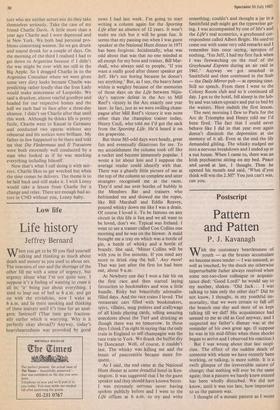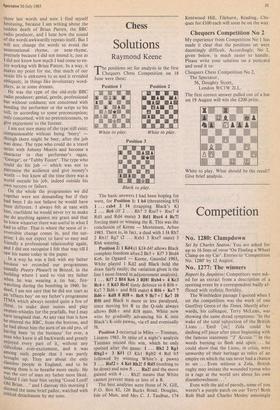Postscript
Pattern and Patten
P. J. Kavanagh
With the customary heartlessness of youth — as the bruises accumulate we become more tender — I was amused, as well as touched, by the shock my otherwise imperturbable father always received when some not-too-close colleague or acquain- tance died: 'Good Lord!' he would say to my mother, shaken. 'Old Jack ... I was talking to him only the other day!' Did he not know, I thought, in my youthful im- mortality, that we were certain to fall off the branch one day and most of us kept talking till we did? His acquaintance had seemed to me as old as God anyway, and I suspected my father's dismay was at the reminder of his own great age. (1 suppose he was in his mid-fifties when these shocks began to arrive and I observed his reaction.)
But I was wrong about that last suspi- cion. The effect of the sudden death of someone with whom we have recently been working, or talking, is more subtle. It is a swift glimpse of the irreversible nature of change; that nothing will ever be the same again; that a pattern we barely knew existed has been wholly disturbed. We did not know, until it was too late, how important to us the pattern was.
I thought of a mosaic pattern as I wrote
those last words and now 1 find myself hesitating, because I am writing about the sudden death of Brian Patten, the BBC radio producer, and I hear how the sound of the words awkwardly repeats itself. But I will not change the words to avoid the unintentional rhyme, or near-rhyme, precisely because I did not intend it, just as 1 did not know how much I had come to en- joy working with Brian Patten. In a way, it makes my point for me, that much of our inside life is unknown to us and is revealed obliquely, in things like involuntary word- Plays, as in some dreams.
He was the type of the old-style BBC radio producer; genial, gentle, professional but without coldness; not concerned with bending the performer or the script to his Will, or according to some preconception; only concerned, with no pretentiousness, to give enjoyment to the listener.
I am not sure many of the type still exist; Companionable without being 'beery' though there might be beer, after the job Was done. The type who could do a travel series with Johnny Morris and become a Character in that performer's sagas, `George', or 'Tubby Foster'. The type who could do his job — which was not to Patronise the audience and give money's worth — but know all the time there was a world outside his job, indeed outside his own success or failure.
On the whole the programmes we did together were not demanding but if they had been I do not believe he would have been different. I always felt at ease with him, confident he would never try to make me do anything against my grain and that he knew whatever there was useful in what 1 had to offer. That is where the sense of ir- reversible change comes in, and the sur- prise: I do not expect to have so easy and friendly a professional relationship again, and I did not recognise I felt that way till I saw his name today in the paper.
In a way he was a link with my father because we recorded our programmes (usually Poetry Please!) in Bristol, in the building where I used to visit my father when he was wearing a tin hat, fire- watching during the bombing in 1940. In- deed, I am not sure that he did not start as an 'effects boy' on my father's programme 1TMA which always needed quite a few of these, to make door noises and play swanee-whistles for the pratfalls, but I may have imagined that. At any rate that is how he entered the BBC, from the bottom, and he had about him the aura of an old pro, of having been 'in the business' for ever, a man who knew it all backwards and greatly enjoyed every part of it, without any ridiculous over-excitement, and it was arhoug such people that 1 was partly brought up. They are about the only classless people in England, and to be among them is to breathe more easily. He was the sort of man my father most liked. Indeed I can hear him saying 'Good Lord! Old Brian... ' and 1 daresay this morning I showed the same brief pallor, watched with critical detachment by my sons.







































 Previous page
Previous page